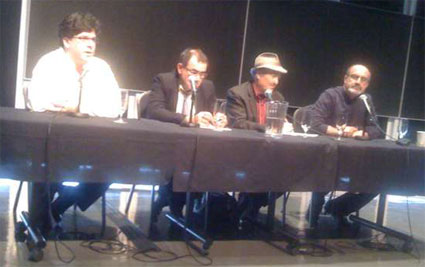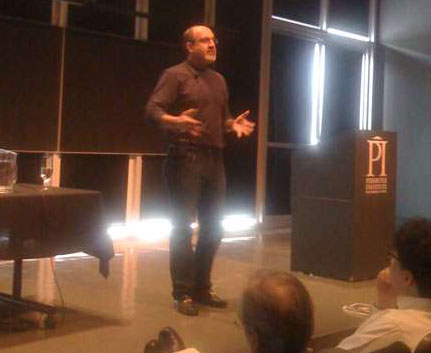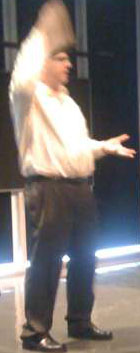
After all, we are witnessing the Waterloo of Wall Street. So, ironically, it was in the Canadian province of Ontario, in the small town of Waterloo, that a meeting was convened to shed new light on the world's financial debacle. In a densely packed conference schedule, the general approach was to take measure of the crisis not only in a new way, but with instruments never used before. Even the venue for event, the Perimeter Institute for Theoretical Physics, was itself programmatic, though invitations to participate were sent far beyond the boundaries of economics and physics to mathematicians, lawyers, behavioral economists, risk managers, evolutionary biologists, complexity theorists and computer scientists. MEASURING THE CRISIS
Are all economists autistic? Perhaps some Physicists and Biologists can help us out of this predicament—in Waterloo, Canada, Nassim Nicholas Taleb provokes with his theses about the elite economists. In December, Edge published "Can Science Help Solve the Economic Crisis?" by Mike Brown, Stuart Kauffman, Zoe-Vonna Palmrose, and Lee Smolin. The paper was prompted by a suggestion by Eric Weinstein for an "Economic Manhattan Project". This led to the Perimeter Institute conference: "The Economic Crisis and its Implications for The Science of Economics". According to the organizers, "Concerns over the current financial situation are giving rise to a need to evaluate the very mathematics that underpins economics as a predictive and descriptive science. A growing desire to examine economics through the lens of diverse scientific methodologies — including physics and complex systems — is making way to a meeting of leading economists and theorists of finance together with physicists, mathematicians, biologists and computer scientists in an effort to evaluate current theories of markets and identify key issues that can motivate new directions for research."
The conference began on May 1st, with a day of invited talks by leading experts to a public audience on the status of economic and financial theory in light of the crisis. I was pleased to be invited and to listen to the first day of public talks. Among those participating were Nouriel Roubini, Nassim Taleb, Emmanuel Derman, Andrew Lo, Richard Alexander, Eric Weinstein, introduced by Theoretical Physicist Neil Turok, who recently moved Cambridge to become the Executive Director of Perimeter, and Lee Smolin, a founding member and research physicist. Doyne Farmer of the Santa Fe Institute, and one of the original Edge contributors, was also in attendance.
Eric Weinstein set the stage with a statement on his talk, which began the proceedings:
Jordan Mejias, arts correspondent for Frankfurter Allgemeine Zeitung and frequent Edge contributor, attended as well. I am pleased to publish his report on the proceedings. |
MEASURING THE CRISIS After all, we are witnessing the Waterloo of Wall Street. So, ironically, it was in the Canadian province of Ontario, in the small town of Waterloo, that a meeting was convened to shed new light on the world's financial debacle. In a densely packed conference schedule, the general approach was to take measure of the crisis not only in a new way, but with instruments never used before. Even the venue for event, the Perimeter Institute for Theoretical Physics, was itself programmatic, though invitations to participate were sent far beyond the boundaries of economics and physics to mathematicians, lawyers, behavioral economists, risk managers, evolutionary biologists, complexity theorists and computer scientists. The thrills were guaranteed by the participants of the conference. Among them were Nassim Nicholas Taleb, best selling author of The Black Swan, who doesn't tire to denounce the economic systems as being unpredictable, and biologist Richard Alexander, who sees evolution as a major driving force behind economic action. With scientists of this order, there was no shortage of creative dissidence. Washington's economic establishment, which remains incestuously connected to the old, now discredited, heroes of Wall Street, must brace itself for a counter-movement, a trans-economic avant-garde that won't even consider half-solutions. Thus the mathematician and economist Eric Weinstein called for nothing less than the creation of a "Manhattan Project" for the economy. In Weinstein's view, physics is very successful in crossing boundaries while still playing by the rules and might therefore be able to pull the economy out of its quagmire. He did not have to wait long to find agreement. The physicist and cosmologist Lee Smolin also described the economy as prime example of complex systems whose study is an emergent area of theoretical physics. Smolin doesn't offer any quick solutions. He fears that the scientific enterprise to uncover the foundations of the economy could encounter more complicated problems than in its own field of research. But he doesn't allow fear to prevent him from having the courage to ask provocative questions and reveal unexpected connections. Weinstein likened the attempts of the conference to provide impetus for a new economic theory with the efforts of the computer industry to constantly offer software upgrades. This approach is, in any case, not the one favored by the economists who currently call the shots in Washington. While Washington is just attempting to put a patch on a burst tire, the crew in Waterloo should, as Weinstein put and postulated it, reinvent the wheel. He duly noted the possibility, and maybe even the certainty, of failure, but remained adamant in his anti-authoritarian, revolutionary thought experiments. And why not, the crisis surely won't be mastered through gentle maneuvering. In the same vain, Taleb confirmed effortless his reputation as a revolutionary, when he recommended closing all economic departments in universities. Thus, he explained with a generous sprinkling of not quite scientific four letter words, we'd automatically advance our knowledge. Making fun of Alan Greenspan, probably the favorite bogeyman of the conference, Taleb used him to exemplify the unpredictability of economic events and autism shown by leading economists. The former Fed chief once called certain events impossible, because they never had occurred. Taleb deduced: Greenspan must be immortal. Why? Because his death has also never happened. Typical events do not exist in Taleb's economic worldview. With this insight, the conference could have come to an early end. Though nobody wanted to quite follow Taleb on this extreme path, even the star economist Nouriel Roubini, whose voice is again being heard in Washington today, didn't mince words. Self-regulation, he lectured, is as good as no regulation. Every layman would easily agree with him and might wonder at the same time about Roubini's diagnosis that we have many sophisticated models of economy, but its basics remained unclear. How can we come up with models without knowing the basics? Why do we need analysts if the emergence of an economic bubble is explained in retrospect with the simple observation that everybody likes it as long as the bubble is inflating? According to Taleb, the fragility of the economic system has led to its destruction. Instead of building a more robust version from scratch, the U.S. government is content to merely reconstruct the system following the old plans. As for Roubini, he especially dislikes the fact that profits are privatized and losses are socialized. But he has not given up the hope that this crisis will and such a crisis alone can trigger changes in the system. And as a quintessentially upbeat American, Weinstein goes so far as to connect the atmospheric change that Barack Obama has brought to America with a possible positive outlook for the economic sector. Difficult as it was to fathom what has happened in the past few months, it had to be impossible to foresee what is going to happen in the coming months and years. In this regard, the conference sought to provide more of an incitement than a recipe. Andrew Lo, one of the prophets whose systemic studies led them to predict this latest collapse of the economy, doesn't belong to those who deny that economics is a science. He managed to uncloak the power of efficient markets in the aftermath of the 1986 crash of the space shuttle "Challenger". It took a government commission four and a half months to inform the public about the cause of the accident. The market knew it after half an hour, as the shares of the company that had manufactured the faulty o-rings collapsed. Lo sees this as an example of the wisdom of crowds. Then the counterevidence, also provided by Lo. He showed a video clip in which a man in a gorilla suit dances through a group playing ball to demonstrate how easily our perception can deceive us. We don't see the gorilla as our attention was directed to the ball players. Why should we expect manmade markets to react differently, to follow a rational course? The conclusions Lo draws for the current crisis are no more reassuring than his predictions for all the surely coming future crises. Like Richard Alexander, who took the side of the biologists at the conference, Lo detects the principles of evolution in the market dynamics. Human behavior plus complex systems plus tight coupling plus absence of negative feedback results in Chernobyl or the Challenger or the economic disaster we are now experiencing. We all could know this, but nobody of us wants to know it. We only pay attention when the winning streak breaks and the party mood of the markets turns into disillusionment. That applies for Hedge fund managers as it does for small investors. John Maynard Keynes, the Comeback Kid of our time of trouble, classified this kind of behavior under the heading "animal instincts". Given that human nature ensures that the next crisis is inevitable, it still would be irresponsible to sit and wait in idle resignation. In order to limit its impact, and for all of us to protect ourselves from ourselves, we must take steps now. Only in times of crisis are we ready to do so. [First published on the front page of the Feuilleton of the Frankfurter Allgemeine Zeitung, May 7, 2009, No. 105/page 31.] |
John
Brockman, Editor
and Publisher |
|Top| |



